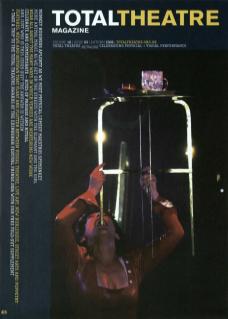Prodigal Theatre's Brighton Festival / Made in Brighton co-commission is a re-working of John Webster's The Duchess of Malfi, a story of one woman in a world of men. It is a play of doors and thresholds, entrances and exits, portals and gateways, births, deaths, and marriages; love and loss – catch the moment of opportunity or the moment at which the whole world falls apart. The action is transposed to '50s gangland Brighton and presented as a promenade piece in and around the intimate Nightingale Theatre, which is sited above a pub next to the mainline station.
On arrival, we have to get past the hi-rent pub bouncers, sharks in shiny suits who are a little too cocky for their own good. The bouncers, it turns out, are the chorus: the lads who do the business for the Duchess's brother, the protector who will go to any lengths to guard her against the world, even to the point of their mutual destruction. It is a production in which the role of the audience is thrown into question. We are – what? Priests in the confessional box, therapists, hospital psychiatrists? All and none of the above. We are not invisible: we are played to and acknowledged as we move from room to room. But we are powerless voyeurs, and in the unfolding scenes of double-dealing betrayal and violence somehow complicit in our non-intervention.
Voyeurism – getting an eyeful, peeping through the keyhole to gain forbidden knowledge – is played upon throughout. The scenography of the show is one of the main dramaturgical tools in creating this play of revelation and concealment: light, shadows and a wonderful moment of complete darkness; mirrors that give sudden shocking reflections of performers or audience; sudden glimpses into an inner sanctum; veils, curtains and shutters opening and closing creating frames within frames (and in one extraordinary coup de théâtre we peer out of the window to see the Duchess and her children scurrying towards Brighton Station in an attempt to escape her guards, passers-by unsure whether to intervene). In another harrowing scene in the downstairs bar, the Duchess and her puppet alter-ego are paraded and pilloried in a burlesque comedy routine featuring some of the most misogynist jokes known to man – a glorious moment of black humour that leaves a sick taste in the mouth.
Sound is an important element – the percussive footsteps of the men, the music of a rough and ready jazz combo, coarse laughter, and the laboured grunts of boxers (played out in a rope ring with human corner-posts). Costume is also thought through with meticulous care: Miranda Henderson's Duchess is resplendent in a succession of '50s-inspired gowns by renowned local designers Simultane; Alister O'Loughlin's Bosola is broody and Brando-esque in his white vest.
All in all a delight. This is a piece which is not afraid to play with form, but never forgets what it is there for. Theatre is the name of the game and this is a truly total theatre: text, physical action, use of site, music and visual imagery combine to create a powerful and moving shared experience. Sex, violence, madness and lovely frocks – what more could anyone want?

